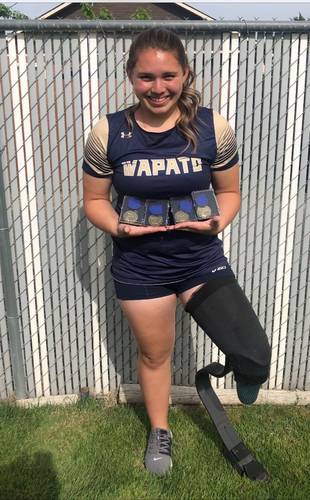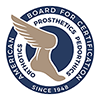
Posted May 10, 2021

Alicia Guerrero lives a normal life. She played sports with her friends growing up.
“I played a lot,” said Alicia. “I did gymnastics, ballet, fast-pitch [softball], volleyball, and able-body basketball.”
What makes her different is that she’s the ASB president for Wapato high School, a Washington state throwing champion and state record holder in discus, shot put, and javelin, and is heading to college to play wheelchair basketball for Illinois.
“Before I didn’t really feel like myself,” said Alicia about the decision to play ambulatory sports. “I was going through the motions in regular sports, but with wheelchair basketball and being in an ambulatory section, I can really be myself to the best of my abilities without comparing myself to others.”
During the track season for the Wolves, Alicia doesn’t compete in the ambulatory section until postseason. Rather, she is able to hold her own marks despite her differences with the other competitors.
“We’ll walk in with sweats,” said friend and fellow thrower Caitlyn Meninick, “and then it’s time to throw and sweats come off, and people are like ‘Whoa… wait a second,’ and then she’s taking first and second in every meet, and it’s just amazing.”
Her track coach Devlin Forrester says she has to do things different because she doesn’t have an ankle or other factors that go into the throwing mechanics. He’s watched her learn how to get the distance despite what some see as shortcomings.
“I was always amazed,” said Coach Forrester, “that she did not let what some might call a disability disable her.”
Alicia has had many competitions, but her toughest challenge has been accepting herself.
“Imagine being a little 5 year old girl trying to walk around the store,” said Alicia, “and having people stare at you.”
She lost her leg at two years old in a lawn mowing accident. Growing up, it was difficult to be different.
“When I was in elementary and junior high,” said Alicia, “I didn’t want to be distinguishable than other students, but it wasn’t until my sophomore year that I started thinking, ‘No, I have a disability. Why am I ignoring this part of my life?’ Then I was able to fully accept myself and was able to break limits that I set on myself at a young age and continue to excel.”
She is referring to the notion that if you have a disability that you can’t be strong, athletic, or vocal. Alicia says she had spent so many years trying to be like everyone else. Coming to the realization that she wasn’t like everyone else was both liberating, and allowed her to find a community of others going through the same thing and says she hopes to inspire others to be more accepting of themselves and others.
“I love how much she’s been able to grow through all this,” said Meninick about watching Alicia’s journey. “She’s become a lot more open and being able to embrace it.”
Alicia has pushed herself to be the best she can be, and looks to continue that at the next level: Both in sports and in life.
“Just like everyone else but do it a little different,” said Alicia. “I play basketball in a wheelchair, but I still play basketball. I may run with a running blade that’s huge, but I still run. I may throw a little more off balance than some kids, but I still throw.
Because as Alicia has learned and taught many others that being different can be a beautiful thing. She’s used her disability to open many doors; both for herself and for conversations with others that perhaps don’t understand what it’s like to be different.
“If I catch someone staring,” said Alicia, “I’ll walk up to them and ask them if they have any questions?”
Alicia is trying to qualify for the Para-Olympics in Tokyo at the trials next month. In addition to playing wheelchair basketball in college, she says she hopes to start an ambulatory throwing team at Illinois.
Story originally posted by NBC

Our patient care facilities are all accredited by the American Board for Certification in Orthotics, Prosthetics and Pedorthotics, Inc. (ABC). This means we have chosen to have our patient care centers measured against the most rigorous standards in the profession. We have the staff, equipment and expertise that ABC believes are important for the delivery of high quality patient care.